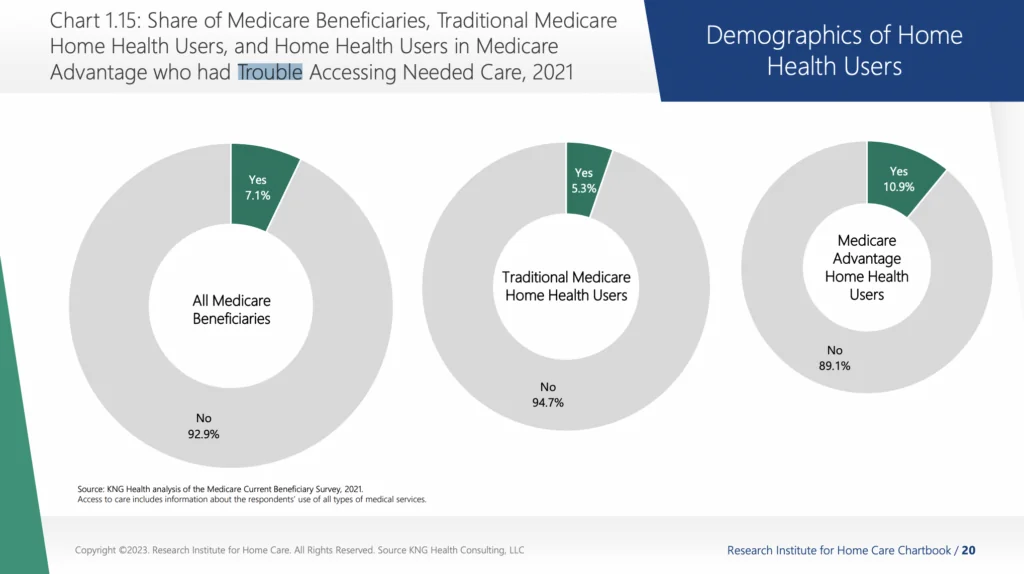Traditional Medicare beneficiaries are finding they have solid access to home health care.
Medicare Advantage (MA) members utilizing home health care, on the other hand, are having a much harder time accessing care.
That’s according to data in the newly released 2023 Home Care Chartbook from the Research Institute for Home Care (RIHC).
The RIHC report is a detailed overview of the home health landscape. It includes data on both demographics and organizational trends.
“Home health users under Medicare say they’re not having much trouble accessing needed care,” Jennifer Schiller, executive director at RIHC, told Home Health Care News. “It’s even at a lower rate than all Medicare patients regardless of setting — so that’s great. One concern that certainly comes up is that one in 10 Medicare Advantage patients say they have trouble accessing needed care.”

Broken down even further, nearly half of those MA patients (47.7%) who have trouble accessing care said they have trouble due to coverage barriers.
“It’s coverage,” Schiller said. “I think certainly something to look at moving forward is addressing those coverage issues.”

In comparison, 23.7% of all Medicare beneficiaries and 27.8% of Medicare home health beneficiaries cited coverage as an issue.
One of the more surprising discrepancies when sifting through more Medicare and MA differences in home health, is the racial breakdown, Schiller said.
Of the traditional Medicare home health users, over 81% are white. For Medicare Advantage home health users, that number is 72.4%.
“Especially the racial breakdown, the disparity between traditional Medicare and Medicare Advantage home health patients is really stark,” Schiller said. “Almost 20% of home health MA patients are Black. Interestingly, it’s not dependent on rural versus urban because in MA and traditional Medicare, patients are almost equally likely to be from a rural setting versus an urban setting.”

Home health patient characteristics
Home health patients continue to be sicker, older and more complex.
The good news for providers is that they seem to be handling those patients extremely well, Schiller said.
Almost half of Medicare beneficiaries (41%) utilizing home health care services have five or more chronic conditions. This is also true when looking at Medicare Advantage (MA) beneficiaries (44.9%).
Those numbers are actually down from last year: 49.4% for MA beneficiaries and 45% for traditional Medicare.
“In home health, they’re seeing a lot more sepsis patients, heart failure patients and generally more high-acuity patients,” Schiller said. “Which is a credit to home health providers that they’re able to handle a really wide variety of different patients. It’s not a one-off benefit.”
One caveat Schiller pointed out is that the discharge patient figures used in the Chartbook report don’t include discharges to the community.
“It’s also possible that some of those hip and knee replacement patients are technically going home to community and then starting a home health episode,” Schiller said. “These patients are much older, much sicker and generally poorer patients in home health. When you add in the fact that you have a very varied caseload, I think it’s a real testament to home health providers that they’re able to really work with any type of patient.”



